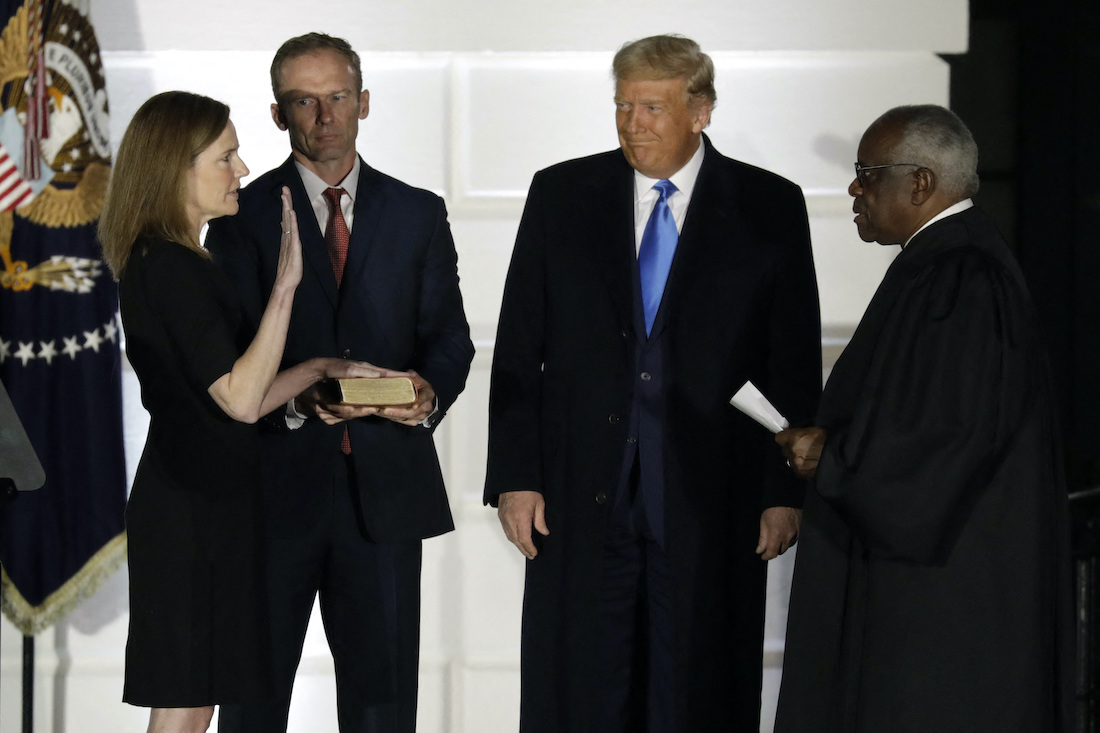Although Amy Coney Barrett has only been a Supreme Court justice for a matter of days, she has the potential to act as the harbinger of a renewed America. She is not only potentially a new role model for working women, but she may also serve as the apostle who introduces Americans to a refreshingly positive view of their own Constitution. In the process, she may reverse the nation’s headlong rush to embrace socialism.
With her unassailable credentials, personal popularity, and winsome persona, Justice Barrett (as we may now call her) represents what Noam Chomsky calls “the threat of a good example.” Such a respectable individual may induce impressionable young minds to entertain less-than-hostile thoughts about the U.S. Constitution – a document that then-Professor Barack Obama told public radio “reflected the fundamental flaw of this country that continues to this day.”
“Nothing threatens the progressive project more than the existence of a Supreme Court that adheres to the Constitution,” wrote David Harsanyi at National Review. “It’s really that simple.” By definition, the Constitution necessarily forecloses efforts to “fundamentally transform America.” It rules out sweeping, top-down government programs financed by massive wealth redistribution. Thus, it – and its supporters – must go.
When allegations that ACB is a charismatic fanatic seeking to outlaw contraception fell flat, her opponents attempted to poison the well about her judicial philosophy: originalism. Sen. Angus King, an independent who caucuses with the Democrats, implied that originalism would outlaw interracial marriages (presumably like that of the court’s most prominent originalist, Clarence Thomas). Former Labor Secretary Robert Reich hinted that originalism considers “Black Americans to be 3/5 of a white person” – a libel as dated as it is erroneous. But no one equaled the rhetorical gales of Sen. Ed Markey, D-Mass., who fulminated:
Originalism is racist. Originalism is sexist. Originalism is homophobic. For originalists, LGBT stands for, “Let’s go back in time.” … Originalism is just a fancy word for discrimination.
Perhaps most ironically, Sen. Markey stated that originalism “has become a hazy smokescreen for judicial activism by so-called conservatives to achieve from the bench what they cannot accomplish through the ballot box.”
Amy Coney Barrett's nomination is illegitimate.
I vote no. pic.twitter.com/PHQZhbPduX
— Ed Markey (@SenMarkey) October 26, 2020
His words are the mirror image of reality. The secularization of U.S. public education, nationwide abortion-on-demand, redefining fundamental relationships, amending the 1964 Civil Rights Act to include commercial activity involving sexuality or gender identity – none of these passed, or could have passed, Congress. “For the past 50 years, the Supreme Court has almost become an unchallengeable, unreviewable super-legislature,” said Tony Perkins, president of the Family Research Council, shortly after Barrett’s ascension to that court.
Recasting justices’ policy preferences as constitutional law is precisely what originalism seeks to prevent. As Barrett explained on the second day of her confirmation hearings:
I interpret the Constitution as a law, that I interpret its text as text and I understand it to have the meaning that it had at the time people ratified it. So that meaning doesn’t change over time. And it’s not up to me to update it or infuse my own policy views into it.
This is the interpretive method the founders expected their successors to use. As James Madison wrote, “In the exposition of laws, and even of Constitutions, how many important errors may be produced by mere innovations in the use of words and phrases, if not controlled by a recurrence to the original and authentic meaning attached to them!”
A predictable, stable, and impartial administration of the rule of law undergirds any successful nation. If the meaning of the law depends on whim, or is subject to deviation with each iteration of the court, chaos follows. Of what consequence is the legal doctrine of stare decisis if the Constitution itself remains infinitely elastic?
The sight of a woman being sworn in by an African American, however, proves our founding document is not inflexible nor wedded to discriminatory views of the past. The Constitution contained a self-correcting mechanism. The amendment process allowed the American people to create “a more perfect union” through the democratic process – one that requires a supermajority specifically to prevent a paper-thin majority from suppressing minority rights. In time, the American people recognized African Americans’ and women’s right to vote. They further swept artificial barriers into the dustbin of history by allowing more people to offer their God-given talents in a system of free and mutually beneficial exchange.
Generations of Americans have been denied this appreciation of America’s constitutional order. Academia ritually denounces our system as irredeemably racist, sexist, and corrupt. And recent surveys show that an overarchingly negative view of the United States correlates with a high level of support for socialism and Marxism.
The carefully chosen words that Amy Coney Barrett offered after she took her oath of office powerfully perforated our nation’s masochistic consensus. “I love the Constitution and the democratic republic that it establishes,” she said. “And I will devote myself to preserving it.”
At Notre Dame Law School, Barrett won the “Distinguished Professor of the Year” award three times. Her greatest teaching opportunity lies in front of her.
